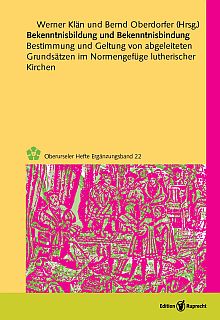Rezension
Lutheran Quarterly, Volume XXXV/1
This book provides a fascinating glimpse into how three different German churches, the United Evangelical Lutheran Church of Germany (VELKD), the Union of Evangelical Churches (UEK), and the Independent Evangelical Lutheran Church (SELK) relate to their confessional documents. Most essays originated in a dialogue on the subject hosted by the SELK. Although all three churches make a claim to Lutheran character, the approaches to the Lutheran Confessions differ greatly. After introductory remarks by the editors and the bishops of SELK and VELKD, the volume opens with a historical article by Christian Peters (Münster) on Melanchthon’s role in confessional formulation. Melanchthon’s emphasis on doctrinal statement over personal or proclamatory confession would lead to corpus doctrinae like the Formula of Concord. The extraordinary significance of his Augsburg Confession especially made itself felt beyond the boundaries of the »Wittenberg Reformation.« Gilberto da Silva (Oberursel) follows with a case study from nineteenth-century Hesse on how to formulate required confessional subscription. Da Silva demonstrates that the dispute is institutional rather than theological and critically suggests parallels to the origins of the Leuenberg Agreement. Union theologian Henning Thießen (Greifswald) considers the application of democratic structures in church and state. The author appreciates a dissimilarity in high-level administration (due to Christ’s retention of all final power and authority for himself), but also a similarity between parliamentary and synodical decision-making, the latter based in the »authority of the word in synodical and parliamentary debate” (89). Robert Kolb (St. Louis) considers the Lutheran confessions outside of Europe, focusing on reception and the ongoing need for translation of the »Wittenberg Way of Thinking.« He also assesses some of the challenges of that missiological translation task. Johannes Hund (Mainz) assesses in a different way than Kolb the same question of reception of the Book of Concord. He notes differences across time as he questions and corrects the views that the Book of Concord was paramount in the period of Orthodoxy and utterly lost during the Enlightenment. Two articles by Christine Axt-Piscalar (Göttingen) address directly the ecclesial place of the Evangelical Church in Germany (EKD). The author sees the EKD as tasked with practicing »unity amidst recognition of structured diversity« (127), a concept she sees rooted in the Leuenberg Agreement and CA VII, and thereby having its particular relationship to its member churches. In the second article, she argues for maintaining the relationship of EKD to VELKD as it presently exists, making neither the Augustana nor the Leuenberg Agreement into an official confession of the EKD. Friedrich Hauschildt, formerly President of the Church Office of the EKD, addresses the identity of the EKD as church and the related question of confessional subscription. Building on Axt-Piscalar’s argument, he reaches a related set of conclusions: the Lutheran churches of the VELKD ought to recognize the churchly character of the EKD, and the EKD ought to act in a way that supports the confessional commitment (carefully described by Hauschildt) of the VELKD churches. The editors’ contributions from their SELK and VELKD perspectives conclude the book. Werner Klän (then Oberursel) underlines aspects of interdependence between scripture, doctrine, and the Lutheran confessions in a way that clarifies the SELK’s inability to adopt the Leuenberg Agreement and questions the interpretation of its adoption by the EKD. Bernd Oberdorfer (Augsburg) opposes Klän. He notes some problems posed by confessional subscription, including difficulties in enforcement, potential contrasts between the confessions and Luther, and a lack of clarity on the relationship of the confessions to the scriptures. These issues lead him to treat the Lutheran confessions as documents to which one often returns, but not as a church-binding explication of scriptural doctrine. Klän and Oberdorfer have clearly documented the different Lutheran approaches to the confessional writings and perhaps confessionalism present in Germany today. The differences are the heritage of major theological decisions of the past, perhaps especially the nineteenth century, home to both Schleiermacher and the confessional revival.
Jacob Corzine








